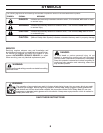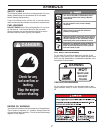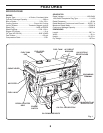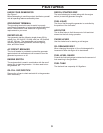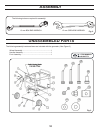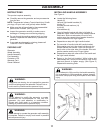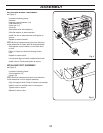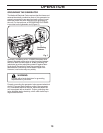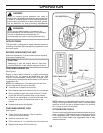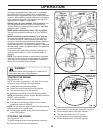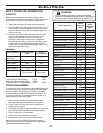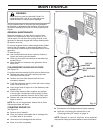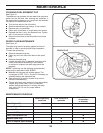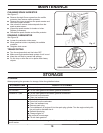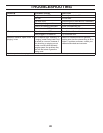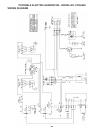
14
OPERATION
APPLICATIONS
This generator is designed to supply electrical power for
operating compatible electrical lighting, appliances, tools,
and motor loads.
BEFORE OPERATING THE UNIT
Position the generator on a flat surface before checking
fluid levels or adding fluid.
DANGER:
Failure to properly ground generator can result in
electrocution, especially if the generator is equipped with
a wheel kit. National Electric Code requires generator
to be properly grounded to an approved earth ground.
Call an electrician for local grounding requirements
WARNING:
Do not use any attachments or accessories not
recommended by the manufacturer of this generator.
The use of attachments or accessories not
recommended can result in serious personal injury.
CAUTION:
Attempting to start the engine before it has been
properly filled with oil will result in equipment failure.
CHECKING/ADDING OIL
See Figure 8.
Engine oil has a major influence on engine performance
and service life. For general, all-temperature use, SAE
10W-30 is recommended. Always use a 4-stroke motor
oil that meets or exceeds the requirements for API service
classification SJ.
NOTE: Non-detergent or 2-stroke engine oils will dam-
age the engine and should not be used.
■ Unscrew the oil dipstick and remove.
■ Wipe dipstick clean and reseat in hole. Do not rethread
■ Remove dipstick again and check oil level. Oil level
should fall within the hatched area on the dipstick.
■ If level is low, add engine oil until the fluid level rises
to the upper portion of the hatched area on the
dipstick.
■ Replace and secure the dipstick.
CHECKING/ADDING FUEL
See Figure 9.
■ Check the fuel level gauge. If fuel is needed,
continue with the next step.
■ Remove the fuel tank cap.
■ Fill the fuel tank to 1 in. below the tip of the fuel neck.
■ Replace and secure the fuel tank cap.
Fig. 8
Fig. 9
NOTE: Always use unleaded gasoline with a pump octane
rating of 86 or higher. Never use old, stale, or contaminated
gasoline, and do not use an oil/gas mixture. Do not allow
dirt or water to enter the fuel tank.
OXYGENATED FUELS
Some conventional gasolines are blended with alcohol or an
ether compound. These gasolines are collectively referred
to as oxygenated fuels. To meet clean air standards, some
areas of the United States use oxygenated fuels to help
reduce emissions.
OIL DIPSTICK
OIL FILL HOLE
FUEL TANK CAP
FUEL LEVEL
GAUGE
FUEL TANK
RES
FUEL



